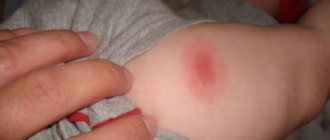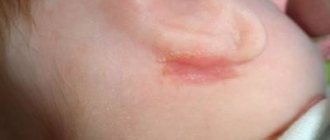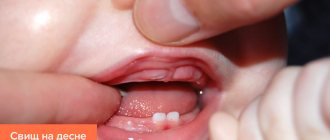Home / Children / Kids
Back
Published: 09/25/2021
0
1811
The reasons why a child coughs in the morning after sleep and when he goes to bed can be variable. Morning cough, as at any age, can be a physiological phenomenon. For example, as a consequence of the manifestation of a protective cough reflex aimed at clearing the airways in the morning. And also as an inevitable reaction after a change in body position.
- 1 Types of cough
- 2 When to start worrying
- 3 Common types of cough
- 4 Cough as a symptom of pathology
- 5 List of diseases accompanied by cough
- 6 External irritants that cause coughing in the morning and before bed
- 7 Treatment of morning and evening cough
Types of cough
Modern medicine is inclined to think about the appearance of cough in a room where there is a potential allergen (dust, fluff, or animal hair), excess heat, cold air or insufficient humidity. The child coughs in the morning after sleep and after a change from a sleepy state to wakefulness, when the frequency and rhythm of breathing changes. But the symptom of cough after sleep in a child easily turns from a simple and natural state of a sleepy body into a pathological and dangerous one if that very notorious excuse appears.
A cough in the morning and evening in a child is probably a sign of a pathological condition in which secretory secretions, copious sputum or an allergic component in a pathological manifestation are present.
It leads to irritation of the nerve endings located in the pharyngeal segment, leading to the appearance of a reflex reaction.
If a child coughs when he goes to bed and cannot fall asleep because this happens again and again, it is logical to assume pathological causes that negatively affect the mucous membrane or respiratory tract with a new change in body position. In such cases, you shouldn’t immediately panic and sound the alarm, and even more so, don’t rush to the home medicine cabinet, scooping out all the medications in a row. For a dry cough, medications are recommended that transform it into a productive one. When wet, on the contrary, they depress the cough center. Incorrectly used medication can only aggravate the condition and make the cough protracted.
Advice from Dr. Komarovsky
Pediatrician E.O. Komarovsky recommends that before carrying out pharmacotherapy, analyze what factor could provoke a cough after sleep , what has changed in the children's room since the appearance of reflex acts.
This could be a new crib, a new toy, or laundry detergent. The problem can be solved by maintaining cleanliness, humidifying the air, proper nutrition and frequent walks in the fresh air.
The pediatrician associates the appearance of a morning cough with inflammation of the nasopharyngeal mucosa - nasopharyngitis. Favorable conditions for the development of pathology are created by dry air, hypothermia of the body, decreased immune activity, unfavorable living conditions, and infectious ENT diseases.
Contact with allergens also precedes the development of posterior rhinitis. A non-standard reaction is provoked by pet fur, dust, and pollen from indoor plants.
Treatment of pathology begins with identifying and eliminating the irritant. To achieve positive dynamics, parents should follow the following recommendations:
- Transfer the child to dietary nutrition . Limit the intake of spicy, salty, fried, fatty foods and spices. Focus on steamed dishes, rare porridges, low-fat broths.
- Treat the nasal passages with saline solution or moisturizing nasal preparations: Aquamaris, Humer, Marimer.
- Be outdoors more often.
- Ventilate the room 2 times a day.
- Control the humidity in the room . The optimal figure is 55-60%. This can be achieved using a humidifier. As an option, hang wet towels on the radiators during the heating season.
- Choose a vitamin complex.
- Provide plenty of fluids.
- Carry out wet cleaning systematically.
Advice! If, due to the accumulation of muconasal secretions, the child’s breathing quality has deteriorated, use a nasal aspirator or improvised means (medical syringe, bulb, pipette).
When a morning cough is combined with high body temperature, nasal congestion and runny nose, conservative treatment cannot be avoided
When to start worrying
Attentive parents with the minimum necessary amount of medical knowledge are confident that a one-time attack cannot be a symptom of a serious illness. The wait-and-see tactic is to monitor the condition. To do this, during the day you need:
- watch the child;
- record negative manifestations if they occur in the morning and afternoon;
- Measure your temperature several times (preferably in the morning and evening).
Against this background, a primary picture of the disease can be drawn up.
- At what time and how regularly does the cough reflex appear?
- Under what specific conditions does it manifest itself?
- Does the child have temperature fluctuations and feverish conditions?
- Does it start only in bed or does it happen in other body positions, as well as in another room.
- Are there any objective prerequisites to suggest the presence of a disease - suffocation, excessive sputum, weakness, headache, dizziness, nausea and vomiting, diarrhea or constipation.
Three of the listed reasons for which a child goes to bed and immediately starts coughing are a signal to see a doctor and get treatment. More than three - the appeal must take place immediately. All of the listed signs in a child - cough after sleep, and in the evening the child cannot fall asleep due to cough - indicate illness.
This periodicity has become a habitual state, and continues during the day - a visit to the doctor should take place immediately. The family doctor and nurse at the children's clinic will probably want to know the reason for the urgent call. In order to give the necessary information, you need to carefully listen to your breathing, find out the condition of the nasopharynx, and look at the throat.
What to do
You can start to worry if your child coughs after sleep for several days in a row. But there is no need to panic. First of all, you should measure the temperature and also carefully examine the baby’s body to see if there is a rash or redness.
You can ask an adult child if he has a sore throat, headache, weakness, nausea or chills. If the answers to all these questions are negative and nothing else bothers him, it is permissible to observe him for a few more days. It is quite possible that the body reacts to some allergen in this way. To confirm or exclude this hypothesis, you need to conduct an audit and maintain order in the nursery. Floors should be washed and dusted daily or at least every other day. If possible, you should get a humidifier and turn it on every night. Bedding must be replaced immediately. If you washed your clothes with some new product and your baby starts coughing every morning, you will have to stop using it. After all, it can cause an allergic cough reflex.
A persistent cough in the morning in children (especially infants) occurs if something foreign gets into the throat. You must immediately call an ambulance.
If parents notice that every time the child wakes up is accompanied by a cough, they must first find out the cause of this phenomenon, and only then take action. This should be done by a doctor. When examining the baby, he will definitely inquire about the nature of the cough:
- After which: on what day did the first attack of morning cough appear and what preceded it.
- Which one: wet or dry; barking type, strong or slight cough; with or without sputum production.
- When: exclusively after a night’s sleep or a day’s sleep too; Is there any coughing in the middle of the night or during the day?
- Associated symptoms: quality of sleep, fever, snot, baby's activity, appetite.
The more detailed the answers to these questions are, the more accurately the doctor will make a diagnosis. Accordingly, the treatment will be competent and effective.
Common types of cough
In medicine, a cough is a specific response of the larynx and pharynx to irritation of the nerves that transmit impulses to the cough center located in the brain. When a person begins to cough, this is a consequence of modifications in the segments of the respiratory organs or auditory canal in one ear, accompanied by stimulation of the bulbus cerebri.
The reason for such a reaction is often determined by concentrating on the duration and nature of exhalation and inhalation of air. This is a common symptom that indicates the disease quite often.
Experts differentiate the following cough variations:
- Coughing is a reaction to the short-term effect of an irritation factor.
- Unproductive, without sputum production. Characterized as dry.
- Moist, with copious discharge of mucous or purulent secretion, wet.
- Barking or almost silent. Inherent in pathological processes in the larynx, laryngeal.
- Unproductive and intrusive, which increases when inhaled.
- Spastic - similar to attacks of ENT diseases and intestinal ailments. It occurs with redness, blueness and a frightening urge to vomit.
- Whooping cough - intense, non-pausing, pain in the central part of the chest.
- A cough that occurs during emotional reactions, as a result of stress or an attempt to draw attention to oneself, is of psychogenic origin.
- Bitonal, i.e. with notes of low and high timbre of bronchial etiology or penetration of a foreign body.
Monitoring the manifestations of the disease, which should be carried out by parents whose child is exposed to the disease, can sometimes become a diagnostic method. Frequency, productivity, intensity of secretion, characteristic signs accompanying cough during the pathological process - everything becomes a determining factor. How often does a child’s cough occur in the morning after sleep, or does it appear in the evening when he goes to bed and doesn’t particularly want to sleep.
After the fact
If parents are concerned about a child’s cough in the morning, first of all, it is necessary to find out its cause. It is possible that this is normal physiology that does not require intervention.
If you hear a slight cough after waking up, you should not immediately stuff your baby with pharmaceutical tablets and syrups. First, you need to carefully monitor him, tracking the frequency, duration and nature of the cough, body temperature (you need to measure it several times a day), and the presence of additional symptoms.
Regardless of whether the child is sick or not, there is no need to worry too much. The most important thing is not to self-medicate at random and consult a doctor in time with pre-collected information, which will be very useful for diagnosis.
Author: Yulia Zablotskaya
Cough as a symptom of pathology
The prolonged nature of the negative symptoms that appear means that treatment should begin immediately. However, a child may cough or choke in the presence of strong odors, during thermal surges, or in an unventilated room with stale air. Such an increase in cough has real reasons for the occurrence of allergic reactions. However, it can be stopped by eliminating the likely cause of irritation.
If your morning cough is constantly accompanied by symptoms such as:
- separation of copious secretions in the form of sputum and sniffles;
- febrile state with elevated temperature.
This is an extremely serious and negative factor that should be treated by a pediatrician or pulmonologist.
How does a child's cough manifest?
Cough is the first symptom that parents notice in a child. They call a pediatrician, who often makes false diagnoses. Parents buy all available medications at the pharmacy, but there is no improvement. The main task will be to determine what the baby’s body wants to get rid of during a cough. Most often, the reason lies in the pathological cough reflex. A command comes from the baby’s brain to clear the lungs of sputum accumulated in them due to swelling of the mucous membrane of the respiratory tract. In such cases, doctors recommend that parents listen to the sound coming from coughing.
- A productive cough is accompanied by a loud cough; something may gurgle inside the lungs. The sound gradually increases in volume as mucus is coughed up.
- Moist cough. The child coughs several times in the morning, at approximately the same time. Usually, this symptom does not recur during the day.
Next, you need to ask the ENT specialist to determine whether there is mucus in the child’s respiratory tract. If it is not there, the cause of the cough lies in irritation of the back wall of the throat. In this case, you need to take your baby to a gastroenterologist.
List of diseases accompanied by cough
- Moist (wet) secretion accumulated in the larynx during the onset of pharyngitis and bronchitis. The first symptoms are coughing.
- Dry manifestations are likely to be a foreign body in the respiratory organs. And also for incipient pneumonia, laryngitis and at the initial stage of bronchitis.
- Wet – pneumonia, caused by a runny nose due to a viral infection. The disease also develops after a cold, aggravated by other factors. Sputum also appears with developing bronchitis.
- In a cough with laryngitis, the throat, pharynx, and larynx are affected. Therefore, laryngitis and diphtheria in this case are the most likely development scenarios. Self-therapy will be lengthy and unsuccessful - the help of a qualified doctor is required.
- A cough in several audible tones is provoked by the presence of an obstacle or a bronchial lesion.
- Coughing at night with severe attacks leading to vomiting usually indicates whooping cough. There is also a type of coughing attack similar to whooping cough. This may indicate cystic fibrosis, but a child can cough directly from the mucous secretion of a viscous consistency in the throat.
- Pastic coughing attacks are a signal of obstruction of the bronchial localization. The disease will worsen and move upward. The attack will intensify as the body tries to get a clean breath of air.
- A psychogenic cough can only be calmed with sedative medications. This type of cough develops after a child has tantrums, crying or worries.
- Pneumonia is accompanied by chest pain and shortness of breath. The affected lung produces sputum that is yellowish and characteristically rusty in color. A child who coughs heavily in the morning may suffer from latent pneumonia.
- Infectious processes when a productive secretion with a purulent odor is released in the morning along with a cough.
- Reflux esophagitis can cause a cough in the morning, and its presence can be determined by belching, complaints of a burning sensation in the chest or an aching stomach. The disease poses a threat to the life and health of the child.
- Residual manifestations are a consequence of the disease, which led to a long process, and now the body, with the separation of sputum, gets rid of traces of the virus.
- A morning cough, when the child continues to lie down but coughs, is often a consequence of worms in the body.
Even with such professional information, you should not self-prescribe medications or engage in any therapeutic measures if the child has a persistent cough. In this case, a relevant specialist should give professional recommendations.
When physiology is to blame for everything
Under what conditions can a morning cough be classified as a physiological manifestation? Then, when he is not accompanied by other unpleasant symptoms, such as hyperthermia, general weakness, increased sweating, attacks of suffocation, etc. If the baby simply clears his throat in the morning and at the same time feels normal the rest of the day and night, we can assume that With the help of coughing, the body is freed from contaminants (dust, fluff) and mucus accumulated during night sleep. Such a cough is easy to recognize - it is dry, consists of several reflex contractions - coughing, which are not repeated until the next awakening after sleep, when the body again has a need to cleanse itself. A physiological cough does not progress, does not cause obvious discomfort in the child, it is simply regular, observed exclusively in the morning (or at other certain times of the day). At the same time, parents should not forget that cough itself is not a disease, and not the cause of the disease, but only a signal that the body needs help, that its airways need to be cleansed.
The causes of physiological cough can be:
1The entry of breast milk into the trachea during feeding in infants.
Mucus accumulation in infants who cannot turn over in their sleep.
Excess saliva in the mouth of babies during teething.
Snotlets that the baby cannot blow his nose and they spontaneously flow down the back wall of the nasopharynx, causing local irritation.
If there is a lot of discharge from the nose and does not go away, then the cough ceases to be physiological and becomes pathological, requiring an examination by a pediatrician, collecting tests and undergoing the appropriate examinations necessary to make a correct diagnosis and prescribe effective treatment.
Lack of parental attention, as a psychological reason for morning coughing, is how the baby “calls” mom or dad to come to him.
There is an opinion, confirmed by a medical council, that if a child coughs up to 10 times during the day, including in the morning, then there is no pathology - this is the normal functioning of the body in an imperfect environment. There is no need to treat such a cough, let parents not worry about it, and do not rush with syrups, nibulizers, and folk remedies for cough. To dispel doubts and make sure there is no pathology, it is enough to see a competent doctor.
External irritants that cause coughing in the morning and before bed
Evening cough, like any symptomatic phenomenon, can begin from pathological and physiological causes. In such cases, you need to focus on the course of the disease, accompanying symptoms and signs, as well as the objective circumstances that provoke the occurrence of cough.
You should not attribute a strong and prolonged attack, due to which the child cannot fall asleep, to the fact that he simply changed his body position or does not want to fall asleep.
After all, at night all hidden pathological processes intensify, which can send signals through sleep that need to be deciphered.
Reasons that make it difficult to fall asleep due to a cough may be:
- ENT complications. For example, adenoids make breathing difficult.
- Allergy. In children prone to such reactions, irritation of the pharyngeal nerves may occur due to dust in the room, pet hair, or flowering plants. It is also recommended to replace the down pillow or blanket and protect the child from detergents and air fresheners. It may be external irritants that cause coughing in the morning and before bed.
With such a variety of possible causes, you should not engage in independent treatment. It is unlikely that a child will be able to calmly remove it if he has worms or pneumonia. And his parents try to help him fall asleep by offering him tea with raspberries.
If the cause is not classified as physiological and the baby requires treatment, the easiest way is to see a therapist at the clinic. In the clinic, undergo diagnostics using modern research methods. Based on the results of the examination, the doctor will prescribe treatment.
Causes of morning cough in a child
Cough is not an independent disease, but a symptom that indicates existing health problems . The nature of cough reflexes depends on the etiology of the disease, intensity, sputum production, and time of manifestation.
If a child clears his throat in the morning and nothing bothers him during the day, then we are talking about the natural process of the body rejecting foreign objects or mucus residues that have accumulated overnight . As a rule, such a cough is wet with the formation of sputum, subsides quickly, and has no tendency to progress.
When the cause of morning cough is nasopharyngitis, the child should sleep with a high head end of the bed or an additional pillow under the mattress
A physiological cough in a child without fever in the morning occurs against the background of the following factors :
- Dry air in the room where the child sleeps causes the mucous membranes to produce an increased volume of sputum to moisturize the upper respiratory tract, which is localized in the nasopharynx overnight.
- Breast or bottle feeding . Some of the liquid food flows into the tracheobronchial tree, which subsequently provokes the expectoration reflex. To anticipate an unpleasant symptom, it is necessary to slightly support the baby's head during feeding. After finishing a meal, support in an upright position to free the digestive tract from air and food debris.
- Teething . During this period, the work of the salivary gland is activated, the secretion of which accumulates in the projection of the throat during night sleep. Naturally, after waking up, the baby needs to clear the airways by coughing.
- A sharp change in body position after waking up . A portion of the pathological secretion enters the trachea, causing a wet cough in the child in the morning. Reflex exhalations are short-lived.
Advice! If the cough appears for the first time, observe the child, pay attention to the presence of accompanying symptoms, general condition and his behavior.
Prerequisites for the manifestation of morning cough may be psychosomatic reasons . In such cases, a cough symbolizes the desire to express oneself, to attract increased attention from adults, or to express an act of disagreement (reluctance to perform any actions, attend kindergarten, school).
Morning cough as a sign of illness
If the child becomes worse, the frequency and intensity of coughing increases, additional clinical forms of manifestation appear, medical attention will be required.
It is important to correctly and timely diagnose pathological disorders in order to reduce the likelihood of chronicity of the disease and prevent adverse consequences.
Causes of pathological cough:
- Bacterial and viral colds . A dry cough in a child after sleep is disturbing at the initial stage of the lesion. Without adequate treatment, the patient's condition worsens, coughing attacks increase in frequency and duration. The baby complains of pain and sore throat, nasal congestion, runny nose, high body temperature, and general malaise.
- Allergy . Cough is one of the forms of an allergic reaction that occurs to dust, pet hair, feather pillows, and bedding. If you notice that your morning coughing gets worse after changing your bedding, it may be a reaction to the new powder or mouthwash.
- Bronchial asthma . A short paroxysmal cough causes discomfort throughout the day, especially in the first hours after waking up. In early forms of the disease, coughing is accompanied by slight formation of sputum. As the patient's condition worsens, the pattern of forced exhalations also changes. Severe and frequent attacks are accompanied by abundant production of pathological secretions; the child experiences pain in the throat, chest and abdominal cavity.
- Gastroesophageal reflux disease . The pathology is caused by the reflux of gastric contents into the digestive canal, which provokes damage to the lower esophagus. It is manifested by such signs as heartburn, vomiting, chest pain, dry throat, shortness of breath, white coating on the tongue, cough, which often occurs in the first half of the day.
- Pertussis infection . It is characterized by a unique character of coughing acts: the disease begins with a dry, frequent cough, which over time becomes paroxysmal in nature. The attacks are repeated one after another, which are completed by a deep breath, accompanied by a reprise (wheezing sound). Crises are repeated systematically throughout the day, but in the morning they are strongest.
- ENT pathologies . Morning outbreaks of cough can torment a child due to the localization of pathogenic microflora, for example, Haemophilus influenzae, in the respiratory tract. Infectious agents increase the production of nasal secretions, which drain naturally during the day. In a horizontal position, the secretion flows down the back wall of the larynx, irritating the receptor endings of the cough center.
Advice! Pediatricians recommend using hypoallergenic household chemicals for washing children's clothes and bedding.
The list of diseases accompanied by intense morning cough is very diverse. The root cause of its appearance may be chronic bronchitis, pneumonia, residual effects after pathologies.
Therefore, it is important to consult a specialist in order to exclude the possibility of serious disorders , to decide whether therapy is needed, and what kind.
The pediatrician determines the cause of cough in the morning based on the results of the initial examination and differential diagnosis data
Treatment of morning and evening cough
Therapeutic agents are prescribed depending on what disease the diagnosis revealed. Experts do not recommend using folk remedies with herbs if your child has allergies, but first consult an allergist.
A foreign body (for example, saliva) that gets into the windpipe and whooping cough, which requires knowledge of medical subtleties, are phenomena of a completely different order that need to be eliminated so that complications do not arise. Experts advise engaging in home therapy and eliminating the provoking cause only in cases where it is known for certain that there are no dangerous diseases behind this symptom.
Treatment tactics will be determined only after tests have been performed, which will make the treatment carried out competent. In other words, it will save the child from external diseases and internal pathologies. An appointment with a qualified doctor and an appropriate medical examination will allow you to return to normal sleep and eliminate psychological problems that cause coughing.
Pathological morning cough
Often a cough can be a consequence of a pathological process in the body. In order to avoid complications and detect the disease in time, you need to undergo a comprehensive examination by a doctor.
When a child has a cough in the morning, this can happen for the following reasons:
- ARVI. The cough in the first days of the disease is dry, accompanied by other catarrhal symptoms.
- Reflux esophagitis. The cough reflex increases after eating due to the entry of stomach contents into the esophagus.
- Allergic reactions. Contact with an allergen often causes morning cough in children.
- Bronchial asthma. The coughing attacks are dry, but at the end of them a wet cough appears with a small discharge of sputum.
- A deep, wet cough is a sign of an inflammatory process in the respiratory system.
- Whooping cough. It is characterized by paroxysmal and severe cough with sputum production.
These symptoms require immediate treatment. If you let the disease take its course, a number of complications may arise.











